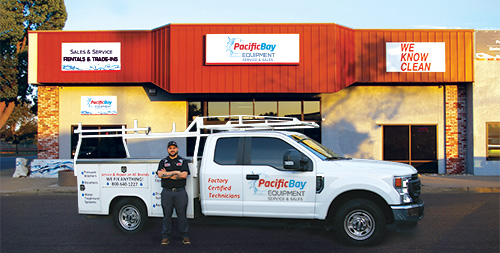Are you prepared for power outages?
Is your company ready if the power goes out? With El Nino coming this winter and wildfire season now a year ‘round issue, the last thing you want to be doing is scrambling around trying to find a generator when there’s a power outage, especially an extended one. But when it comes to selecting a generator that will power your business, there are certain things you should look for …

Right Power. Right Size. Reliability.
The Wrong Generator can equal Trouble. Depending on the environment and equipment you want to power up, you need to select the right size generator. Installing the wrong size power source can result in unreliable performance, system failures, property damage and even employee safety concerns.
4 key steps to selecting a reliable power backup system.
As with any piece of industrial and commercial equipment, you should have an understanding generator sizing in order to select the most effective and efficient options.
#1: Determine Your Usage
To select a type that best meets your requirements, first evaluate your needs and assess how you plan to use the generator. There are 3 main categories:

Emergency
For essential systems. These aren’t for keeping your whole facility running during an outage, but they can temporarily power fire alarms, emergency lights and other safety systems.

Standby
In the event of an outage, these independent sources power the entire facility. They will switch on when they detect failure of the primary energy source, and can turn on with few delays to keep disruptions to a minimum.

Primary
Acts as the facility’s main power source, used by some companies as the principal power source.
#2: Assess how much power you need.
Generators come in a wide range of sizes and configurations. Key considerations include determining how and where it will be used and the amount of power and wattage required to support all your applications. Plan ahead and make a list of everything the generator will need to power at any given time. This will be used to determine your load capacity range and help determine how big a generator is needed. Sizing is based on kilowatt output, with higher output units offering more capacity.
#3: How and where will it be used.
Some important questions to consider when evaluating models:
- Do we need a portable or stationary solution?
- Does our facility have a limited amount of space or environmental concerns?
- If we rent our space, what are the commercial property owner’s policies on generators?
- What fuel type would work best for us?
- Are there any emissions or voltage regulations we need to be aware of?
- What type of electrical system connection and supply rating is needed?
#4: Consult with a Professional.
To ensure you’re getting the right size, right power and reliability, it’s advisable to consult with a trained power system professional or certified electrician to be sure what size generator will meet your needs.

Don’t wait until your power goes out!
Contact our experts to discuss your backup generator needs. We carry portable and stationary gas generators designed by industry-leading companies.

